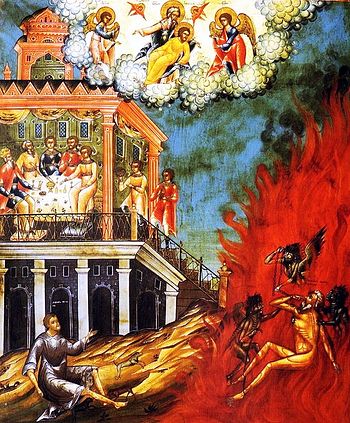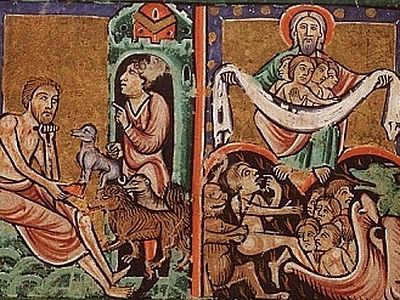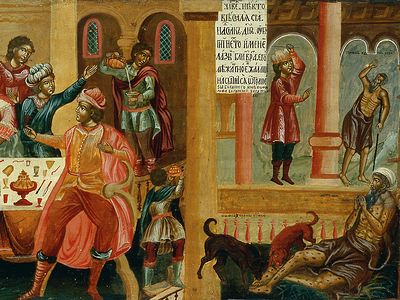The parable of the rich man and Lazarus shows us a foolish misuse of material goods. It raises slightly the curtain covering certain mysteries about man's portion beyond the grave. We encounter this parable in the Gospel according to Luke:
"There was a certain rich man, who was clothed in purple and fine linen, and fared sumptuously every day: and there was a certain beggar named Lazarus, which was laid at his gate, full of sores, and desiring to be fed with the crumbs which fell from the rich man's table: moreover the dogs came and licked his sores. And it came to pass, that the beggar died, and was carried by the angels into Abraham's bosom: the rich man also died, and was buried; and in hell he lifted up his eyes, being in torments, and seeth Abraham afar off, and Lazarus in his bosom. And he cried and said, Father Abraham, have mercy on me, and send Lazarus, that he may dip the tip of his finger in water, and cool my tongue; for I am tormented in this flame. But Abraham said, Son, remember that thou in thy lifetime receivest thy good things, and likewise Lazarus evil things: but now he is comforted, and thou art tormented. And beside all this, between us and you there is a great gulf fixed: so that those who wish to pass from hence to you cannot; neither can they pass to us, whon would come from thence. Then he said, I pray thee therefore, father, that thou wouldst send him to my father's house: for I have five brethren; that he may testify unto them, lest they also come into this place of torment. Abraham saith unto him, They have Moses and the prophets; let them hear them. And he said, Nay, father Abraham: but if one went unto them from the dead, they will repent. And he said unto him, If they hear not Moses and the prophets, neither will they be persuaded, though one rise from the dead" (Luke 16:19-31).
A first-time reading of this parable does not make clear why the rich man ended up hell. Because he was rich in this life? We know from the Gospel that wealth is seductive, but not all the rich are condemned. Zacchaeus, the rich tax collector, in spite of his wealth, was saved with all his family (Luke 19:1-10). We remember the wealth of Joseph of Arimathea, the disciple of Christ, in whose tomb the Savior was buried (Matthew 27:57-60). Likewise, the Pharisee Nicodemus, one of the chiefs and leaders of the people of Israel was not a poor man. He brought a hundred liters of expensive aromatic oils to anoint the body of Jesus Christ (John 19:39). We remember that Lord Jesus Christ did not condemn the rich young man for his wealth, which did not hinder him from faith or from keeping all God's commandments, or from coming and venerating Christ as a teacher. Christ did not condemn the rich man's way of life, but pointed out a more perfect way of life to him. Christ never said that the rich cannot enter into the Kingdom of God, but that men cannot enter into it who trust in wealth, who think that wealth rather than God will save them (Mark 10:24), and who make an idol or fetish of wealth (Mammon).
The Bible has many righteous men who were very rich: The righteous Joseph, the son of Israel, controlled the treasures of Pharaoh, arrayed like a royal prince (Genesis 41:40-45) as second man in the realm. The righteous Job - blameless and God-fearing - was also rich: He had 7,000 head of livestock, 3,000 camels, 500 pair of oxen and 500 she-asses and a great many servants (Job 1:3).
The Christian Church has glorified many emperors and kings - those anointed to reign - who held all the wealth of their country as personal property, and who did let wealth become their God. In Russia and America millionaires have done a great deal of good in philanthropy.
But all the same, why did the rich man in the parable we are examining end up hell? The parable does not say that he was evil, cruel, depraved, godless or impious. The Evangelist Mark explains the problem: that he trusted in wealth. "How hard it is for them that trust in riches to enter into the kingdom of God!" (Mark 10-24). Money is not bad in itself, but one's attitude toward money must be ironic.
On the contrary, it is good to be dissatisfied, always "to hunger and thirst after righteousness." It is good to be always "poor in spirit" and to ask alms of Christ unceasingly. For conversion to Christ, we must be uneasy, always seek and asking, always in thirst and be in need, always be know ourselves as destitute, not self-sufficient, but dependent on God. The rich man's lived only for the flesh; he enjoyed earthly goods and stifled within himself every part spiritual life. He really prepared for himself his bitter fate. The Apostle Paul says: "Be not deceived; God is not mocked: for whatsoever a man soweth, that shall he also reap. For he that soweth to his flesh shall of the flesh reap corruption; but he that soweth to the Spirit shall of the Spirit reap life everlasting" (Galatians 6:7-8).
Each man prepares his portion beyond the grave. If he abides in God's commandments to love God and neighbor; if he repents when he transgresses these commandments in any way; if he nourishes his soul with Church mysteries; if he abides in prayerful communion with the Lord; then about such a man one may say that he soweth to the Spirit. Such a man in this life begins communion with the spiritual world; he becomes its citizen. After death, such a man enters into a better world and enjoys its good things, which his life here taught him to enjoy.
Genuine faith begins with repentance, recognition of one's spiritual poverty and sinfulness. "Repent ye: for the kingdom of heaven is at hand," say both the Forerunner and Christ (Matthew 3:2, 4:17). The Kingdom of God belongs to the sincere Christian who prays "Lord Jesus Christ, Son of God, have mercy on me, a sinner!" Without this prayer a Christian cannot live. Consciousness of one's sinfulness, poverty and helplessness makes a Christian a disciple of the Savior and a member of Christ's Church.
The destitute Lazarus gained heaven, of course, not because of his material poverty, but because of his knowing his spiritual destitution, and listened to Moses and the Prophets (Luke 16:29). And the rich man of the parable did not gain heaven because he lacked this spiritual need and he trusted in his wealth as in an idol. He did not feel a need for God's help. He became so hardened in soul that he showed no compassion for Lazarus, who lay at his gate in constant view. The soul of the rich man could not love his neighbor.
What can such a man expect in the world beyond the grave? He cannot commune with God, Who is love, and Whose communion requires love, and not with the other sprits of the righteous. Such a man must remain apart from God and from the world of the righteous; he must remain in outer darkness. The passions that the rich man managed to amass during his life will burn him with everlasting fire. His conscience which he had ignored will become an unsleeping gnawing worm in him. He himself is to blame, who ignored God's constant warnings. He cast himself into the abyss of hell.
The parable of the rich man and Lazarus suggests that the torment of sinners will be endless. And The torment of fire burns but does not consume. But the fire, smoke and other horrors are images that distort the torments of hell. According to the teaching of the Holy Fathers of the Church, the torments of hell are not physical sufferings, but remoteness from God and his mercy, which is possible only in conditions of full and sincere repentance. Therefore, the torment is endless only because repentance is impossible.
Metropolitan Antony (Khrapovitsky), the preeminent theologian of this century, points out that the Gospels speak of everlasting punishment in time, but that everlasting is not synonymous with endlessness. According to Metropolitan Antony', the Word of God does not define the endlessness of the sufferings of all sinners not fix their fate as unchangeable. Abraham's words about the gulf between the righteous and sinners in the other world, which cannot be crossed, does fix the sinner's lack of repentance.
Metropolitan Antony's continues on our fate beyond the grave: "The parable of the rich man and Lazarus gives us, as it were, two rays of hope for a more consoling prospect. First of all, we see that Abraham in paradise did hear the rich man, and, consequently, there is between them some kind of communication, if only in the form of conversation. This, their conversation, indicates that sinners have the thought and hope for something better. This alone already eases their condition, because the most fearful thing is not the suffering itself, but the hopeless consciousness of the endlessness of the sufferings. The rich man does not have this hopeless consciousness; but, on the contrary, he has an aspiration and hope for something better."
"Secondly, the rich man begins to feel sorry for his brethren. This shows that good feelings had awakened in him, that he had begun to repent and hopes for their repentance. This means that in the life beyond the grave a certain change in a man's state is possible, because repentance that has begun can already turn into full repentance and then into compunction."
"The rich man does not yet know full repentance. For the present, he only understands the causal tie between his condition before, on earth, and now, in hell; but he does not understand the justness of his condition. But all the same, he has begun to feel sorry for his brethren, which is very important for the further development of his soul."
"If in that life there is a possibility of changing one's state in the sense of manifesting good feelings and repentance, then one must allow the possibility of full repentance and then compunction; then one must allow the possibility of hope that the doors of paradise are not closed once and forever. One must likewise allow the hope that, in passing through some kind of suffering, the soul of the sinner, if it has not become completely hardened, can become capable of repentance, at first partially, as with the rich man, and later fully; and then the soul can revive for spiritual compunction and salvation."
Let us ask the Lord to imbue in us the need, the hunger, and the thirst for the divine sap from the Vine of Christ, given to us all at the Lord's Table, at the Holy Eucharist. Let us pray that our minds grow poorer in spirit, that we, like Lazarus and the beggars who stand on church porches, stretch our hands out and beg alms of Christ, Who Himself, according to the Apostle Paul, "though he was rich, yet for your sakes he became poor, that ye through his poverty might be rich" (II Corinthians 8:9).




